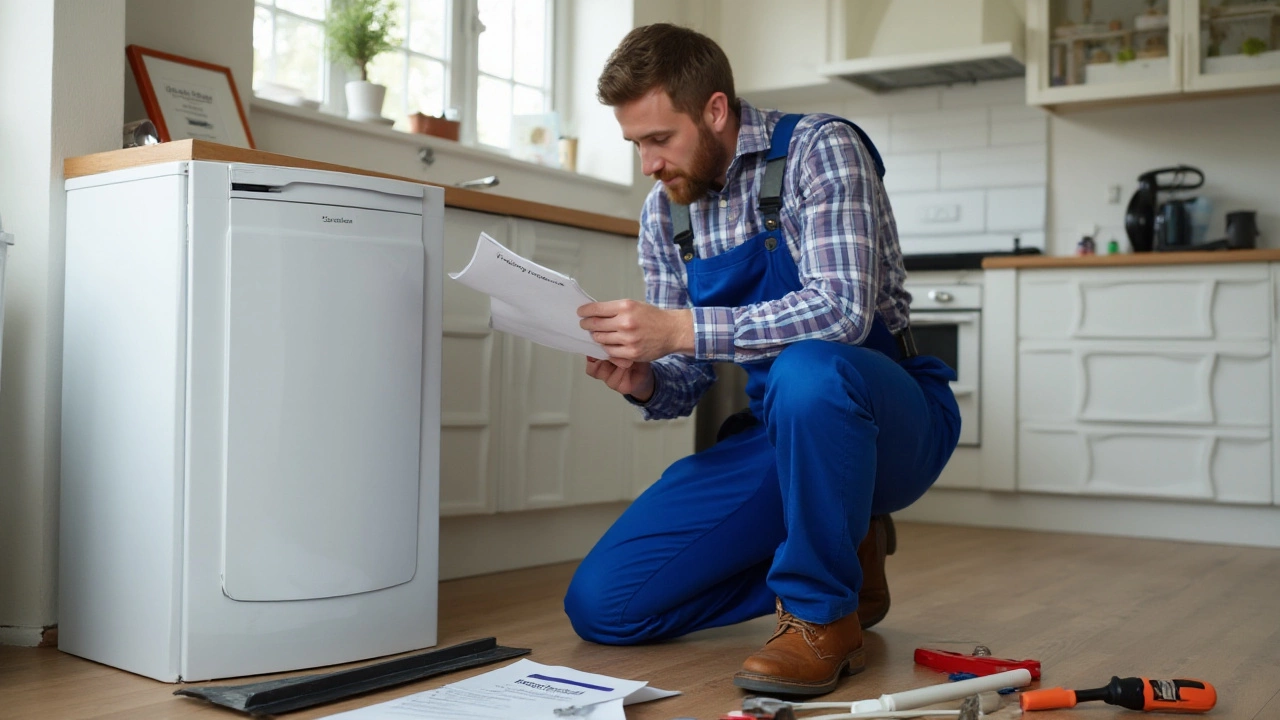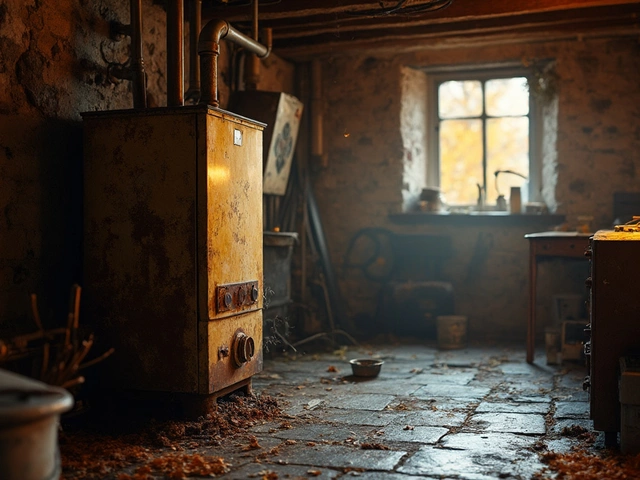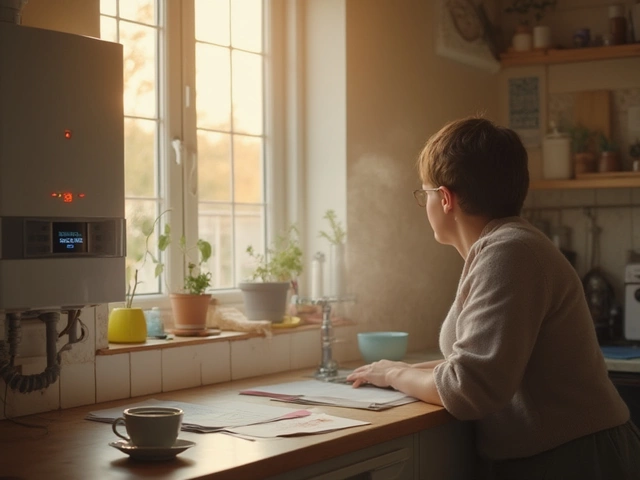When it comes to maintaining the warmth and comfort of your home, boilers play a critical role. If you're facing issues with your boiler or considering a replacement, you might naturally think of calling a plumber. But is a plumber really the right person for the job?
The question of whether plumbers change boilers isn't just about turning wrenches and connecting pipes. There's more beneath the surface that both homeowners and renters should be aware of. Let's explore the professional landscape involving plumbers and boilers, and help you make informed decisions about your heating needs. Understanding who to call can save you time, money, and prevent unnecessary headaches in the future.
- The Role of Plumbers in Boiler Work
- Qualifications and Certifications Required
- Benefits of Hiring a Heating Engineer
- Risks of Using Unqualified Professionals
The Role of Plumbers in Boiler Work
Plumbers are pivotal players in the world of residential maintenance, especially when it comes to anything involving pipes or water systems. Traditionally, their expertise lies in the installation and repair of water supply lines, waste disposal systems, and related appliances—everything from leaky faucets to clogged drains. But where do plumbers fit into the picture when it involves boilers? This can be a bit complex because boilers straddle the line between plumbing and heating, combining elements of both practices. Many plumbers possess the necessary skills to handle basic boiler maintenance and repairs, such as fixing minor leaks or addressing issues with water pressure. However, this doesn't automatically make them specialists in heating systems.
It's crucial to recognize that, while plumbers can manage certain boiler tasks, significant projects, like boiler repair or complete replacements, require more specialized knowledge and certifications. This distinction is vital for ensuring the safe and efficient operation of your heating system. Consider that even a minor error during installation or repair can lead to safety hazards, including gas leaks or carbon monoxide poisoning, dangers no homeowner wants to face.
In the UK, for example, individuals who work on gas appliances, including gas boilers, must hold Gas Safe registration. This is a legal requirement. The Gas Safe Register is an official list of gas engineers who are qualified to work safely and legally on gas appliances. A survey conducted in 2022 revealed that as much as 50% of homeowners were unaware of this requirement, underlining the importance of proper awareness in boiler-related decisions.
"When it comes to gas work, including the installation of gas boilers, only a Gas Safe registered engineer is legally allowed to carry out the job. It's not just about fixing a leak; it's about ensuring the complete safety of your home," advises the Gas Safe Register.
To summarize, while plumbers certainly handle many aspects of pipework related to your boiler system, they might not always possess the specific qualifications to work on gas boilers unless they're also certified in this field. For intricate jobs, particularly those involving gas connections, you might want to consider hiring a heating engineer—a professional whose training focuses extensively on heating systems and boilers.
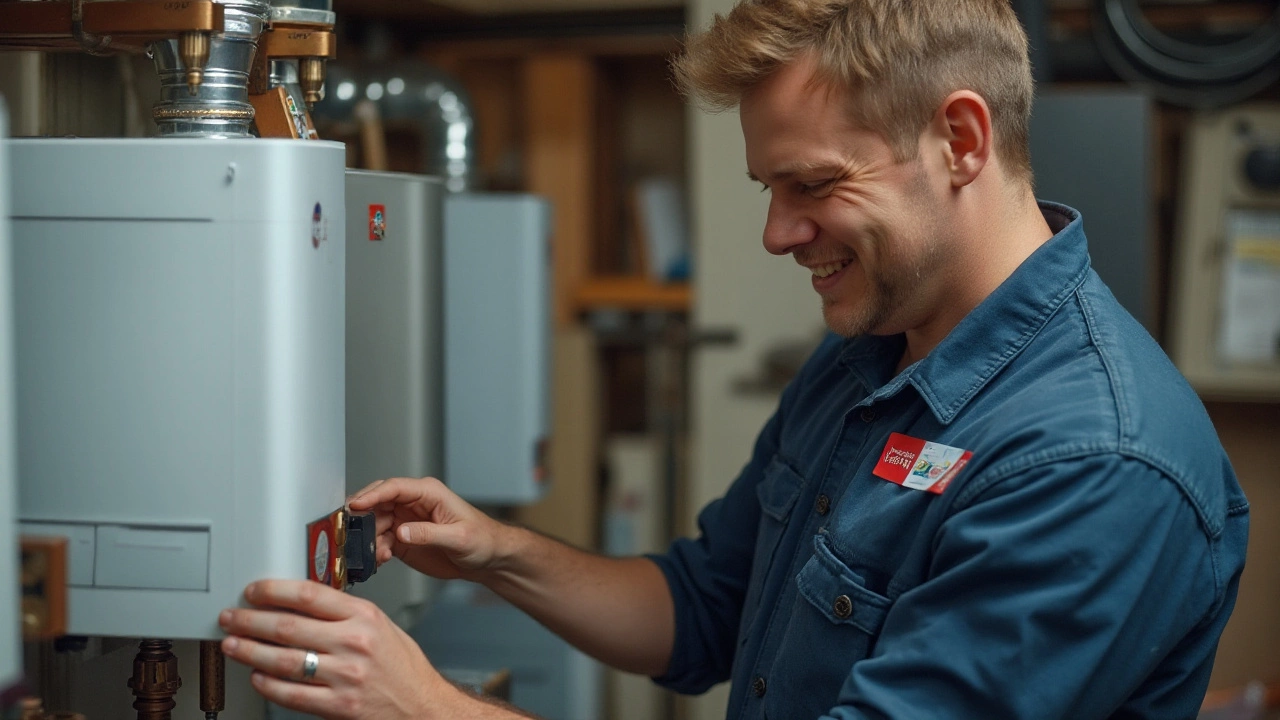
Qualifications and Certifications Required
Handling boiler installations and repairs isn't just a matter of technical skill; it requires specific certifications and expert knowledge about heating systems. In the United Kingdom, any professional dealing with boilers must be registered with Gas Safe, which is a legal requirement that ensures the safety and reliability of the service provided. Gas Safe registration is not just a bureaucratic hurdle; it verifies that the technician has been thoroughly tested for their competence in working with gas appliances, including boilers, which can pose serious risks if mishandled.
To attain Gas Safe registration, a professional must complete a comprehensive training course that covers all aspects of gas safety. This is not a one-off certification; engineers must renew their Gas Safe certification regularly, ensuring they are kept up to date with the latest safety standards and techniques. This repeated validation is crucial given the evolving nature of safety protocols and technology. A plumber working on boilers without this registration puts the homeowner at risk of inadequate repairs and potential safety hazards.
Additional Certifications and Training
Apart from Gas Safe, other qualifications may include an NVQ diploma in plumbing and heating, which provides additional assurance of the technician’s ability to handle complex heating systems. Depending on the boiler type and complexity, further specializations might be needed. Engineers trained in specific brands or models often have insights that only dedicated learning can impart. In this field, on-the-job experience plays a significant role, often guiding practical decision-making beyond basic teachings. Heating systems are increasingly integrating with smart home technologies, meaning technicians often need supplemental courses on digital and electronic systems as well.
"Working with a certified professional not only ensures the safety and efficiency of your boiler, it also optimizes your system's longevity," says the Chartered Institute of Plumbing and Heating Engineering.
In addition, many professionals participate in Continuous Professional Development (CPD) programs. These programs help them stay competitive and maintain a high level of service. CPD encompasses a variety of topics, from the newest technologies to changes in regulations, and it's essential for those who wish to go above and beyond the minimum requirements. Therefore, when hiring someone to repair or install a boiler, it's crucial to inquire about their trainings and how current their certification is.
For those homeowners considering a DIY approach, it's essential to remember that without the proper qualifications, even a seemingly simple task can escalate into a dangerous situation. Not only does hiring an unqualified individual risk non-compliance with legal standards, but it may also void warranties and insurance policies. The peace of mind gained from a properly certified technician is worth the investment, ensuring safety, compliance, and efficiency in keeping your home warm and comfortable.
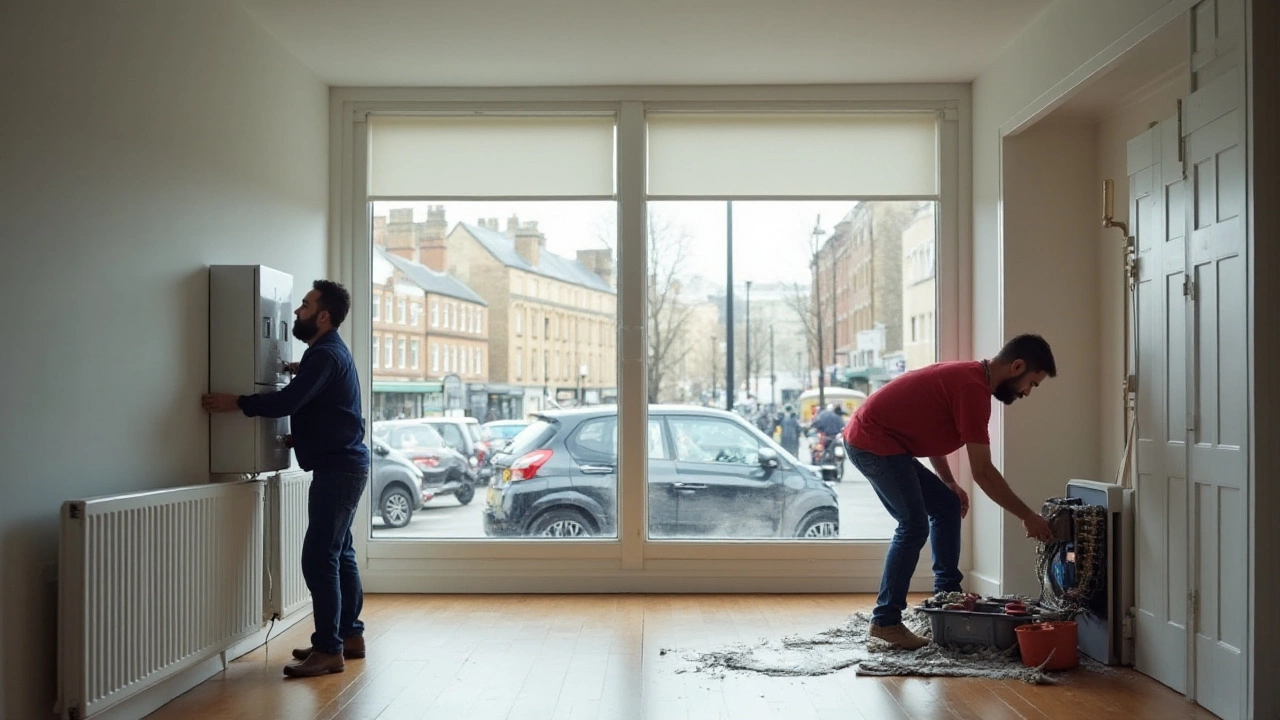
Benefits of Hiring a Heating Engineer
Choosing to hire a specialized heating engineer rather than a general plumber for your boiler work has an array of advantages. First and foremost, heating engineers undergo extensive training specific to heating systems, giving them a deep understanding of how such systems are designed, installed, and maintained. This rigorous focus on boilers and related heating systems allows them to troubleshoot and resolve issues with greater precision than professionals who spread their expertise across a wider range of plumbing tasks.
One of the most compelling reasons to opt for a heating engineer is the assurance of safety. A malfunctioning boiler can be a serious hazard, with risks including carbon monoxide leaks. Heating engineers are trained to meticulously check and prevent these dangers, ensuring that your home remains a safe environment. The value of peace of mind cannot be overstated when dealing with potentially life-threatening scenarios.
The economic benefits are also significant. While hiring a heating engineer might seem costlier upfront, their expertise often leads to long-term savings. They are adept at ensuring your boiler operates at peak efficiency, which can result in lower energy bills. Furthermore, their comprehensive inspections often catch minor issues before they develop into costly repairs, providing another layer of financial protection.
| Factor | Plumber | Heating Engineer |
|---|---|---|
| Specialized Training | General knowledge | Specific to heating systems |
| Safety Assurance | Basic checks | Comprehensive safety checks |
| Cost Efficiency | Possibly lower initially | Greater long-term savings |
Moreover, in the UK, engineers registered with the Gas Safe Register carry a visible mark of trust and competency, a legal requirement for anyone working on gas appliances. This certification guarantees that the engineer is qualified to work on gas-fuelled equipment safely, which should be a critical consideration for anyone employing someone to change or repair a boiler.
According to John Lane, a seasoned heating engineer, "The difference in expertise between someone who occasionally fixes boilers and a dedicated heating engineer can be monumental, not just in execution, but in design and optimization of a property’s heat distribution as well."
Heating engineers can often provide valuable insight into modern heating solutions, offering consultations on energy-efficient alternatives that new technologies present. Whether you're curious about the latest in renewable energy sources or simply want tips on maintaining your current system, a heating engineer can be an invaluable resource. Their industry connections may also grant you access to better prices and warranties for new equipment.

Risks of Using Unqualified Professionals
Ensuring the proper function of your boiler is crucial, not only to keep your home cozy but also to safeguard the well-being of everyone in the household. In today's world, where the line between different types of workers can sometimes blur, it's vital to understand why settling for unqualified professionals, like those without the proper plumbing licenses or inadequate experience, might open the door to numerous hazards. Many people don't realize the legal implications of having uncertified individuals perform such critical work. For instance, UK law mandates that all boiler installations must be carried out by a Gas Safe registered engineer. Ignoring this requirement can lead to severe penalties, not to mention the risk of invalidating your home insurance.
One of the primary risks linked to using unqualified professionals for boiler work is safety. Boilers, by nature, involve gas appliances, which means that any mistakes during installation or repair can lead to dangerous gas leaks, and in the worst-case scenario, even carbon monoxide poisoning. This silent killer is notoriously difficult to detect, as it is both odorless and colorless. Shockingly, statistics show that in the UK alone, there are approximately 60 deaths each year due to accidental carbon monoxide poisoning, a stark reminder of the importance of proper boiler care. An untrained worker might not recognize subtle signs of leakage or misalignment that could result in hazardous outcomes over time.
Using someone without the necessary qualifications also poses financial risks. Initially, it might seem like you're saving money by hiring someone who isn't fully certified, but any short-term savings can be quickly eclipsed by longer-term costs. Poor workmanship often leads to more frequent breakdowns, increased maintenance, and potential doubling up of work that needs to be done correctly. Additionally, manufacturers typically require proof of professional installation to validate warranties. Engaging someone without the right credentials can mean you miss out on such benefits, ultimately resulting in higher replacement or repair costs.
An often overlooked risk is the potential negative impact on property value. Homebuyers today are more informed and cautious, frequently requesting detailed checks on heating systems before finalizing a purchase. A poorly installed or maintained boiler can signal to potential buyers that other corners might have been cut in home maintenance, thereby reducing the allure and value of your property. And in cases where the work doesn't meet regulatory standards, selling might involve legal complications or forced renovations to bring utilities up to date.
According to the Chartered Institute of Plumbing and Heating Engineering, "Investing in qualified professionals ensures not only a job well done but peace of mind knowing that the safety and efficiency of your boiler are in expert hands." Thus, utilizing a certified and experienced heating engineer is an investment towards preserving both home value and personal safety.
Finally, there's the environmental perspective. An improperly functioning boiler is less efficient, meaning it burns more fuel for the same amount of heat, which can lead to increased carbon emissions. With a growing emphasis on green energy and sustainability, having a professional install or repair your boiler can ensure your system operates at peak efficiency, aligning your household with global efforts towards reducing carbon footprints. It’s another reason why entrusting only qualified professionals with your boiler can have far-reaching benefits beyond immediate home comfort.

